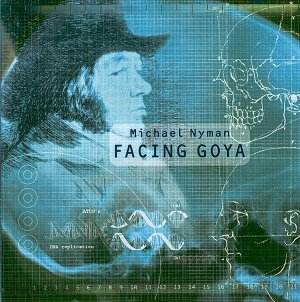I have to say at the outset that I did not reach the
same conclusions, after listening to this work, that the previous reviewer
for this site did. This four act opera is excellently played, recorded
and packaged (full libretto and expansive, multi-author notes included),
as you would tend to expect from Warner Classics these days, but also
addresses some highly pertinent and relevant issues of today through
an ingeniously conceived time-travelling storyline. It is a tribute
to Michael Nyman (and of course his librettist) that he is able to rebut
those who accuse him of triteness and (over?) commerciality with a scenario,
related through highly listenable and often gripping music, that sets
the moral miasma which characterises the "new" eugenics within a centuries
old context. Along the way we encounter the great Spanish painter Goya,
Hitler and a host of inter-related and generally dubious ideas (the
line "Goya saw Hitler before Hitler saw Goya!" will remain in my memory
for some time).
I would concur that anyone who totally detests the
Nyman style of composition, i.e. the repetitive and often high velocity
ostinati, the chugging, squelching(?) brass (especially sax)
may not find much (other than perhaps the fascinating storyline) to
grip them here but, for the rest of us, there is a great deal to admire,
even if it has to be admitted, the music, in the last analysis, does
not consistently reach the heights of what I regard as his (mostly
instrumental) masterpieces, e.g. Where The Bee Dances, MGV
and, of course, The Piano Concerto (the Argo disc containing
the latter two pieces original recordings was probably the most played
disc, for nostalgic British reasons as well as musical ones, during
my self-imposed exile in Bahrain in the mid 90s - encapsulating just
as much as VW, in its own way, the spirit of the much missed landscape
and culture). That said, it is well worthy of your attention, and certainly
stands up well when compared to say The Civil Wars of Philip
Glass.
The brooding melancholia of the Prelude evolves
into the powerful Dogs Drowning in Sand to launch Act 1 with
a real sense of purpose. The remainder of this act and Act 2 are largely
concerned with Goya himself (and the posthumous history of his various
body parts!) and a range of contentious eugenics-related ideas, e.g.
those of Galton (much beloved of the Nazis) - "Just because Goya was
a fat Spaniard who liked chocolate does not make him a burglar" is a
typical lyric from a passage which acts as a critique on the supposed
link between genetics and crime. While the first disc, wherein the first
two acts are contained, has its fair proportion of the usual Nyman musical
rumbustiousness, there are also several moments of quite beautiful and
contemplative music (those who know the works mentioned above, especially
MGV, and others like Strong on Oaks
, will be (but will
not need to be!) reminded that Nyman does indeed possess such a musical
alter-ego to the more publicly renowned and displayed one).
The remaining two acts (on disc two) continue in the
same vein but perhaps with an even greater emphasis on lyricism and
restraint - the subject matter here is very much more of the present
day though, with reference to genomes and cloning (and their commercial
exploitation and moral neutrality(?)). It is difficult to do full justice
to the intelligence and depth with which these topics (burning issues?)
are covered without resorting to quoting huge chunks of the libretto.
As the opera began, so it finishes, with a great surge of what can only
be called emotional power, distilled perhaps from the extremity of the
inspirations from which it was drawn. The portentous Dogs Drowning
in Sand (named for one of Goya's sketches - included in the booklet)
makes a temporary reappearance, after a section (about cloning) entitled
How can you be so stupid, with the last words left to Goya himself
- "I don't need to prove that I am human. It's there for all to see.
You blind bankers wear masks of greed. Some artists go naked so others
are freed...".
This work, premiered, rather appropriately, in Santiago
de Compostela, is probably Nyman's most important, certainly if we are
talking not purely in musical terms. I'd like to view it as a pilgrimage
of conscience against some of the more horrific visions of the future
"progress" has to offer us, cast in the knowledge of past atrocities
of rather too similar provenance. This should be required listening
(and the libretto required reading) for every politician, scientist,
teacher etc. It revisits themes Nyman has touched on before (Act 3 quotes
from the composer's own theme to the sci-fi movie Gattaca - the
name comes from a sequence of bases in the genetic code!) but goes far
beyond in making a real statement about issues that ought to be being
discussed far more than they are at present. The whole package is a
fascinating document and, as well as the words in four languages and
numerous relevant illustrations, it contains excellent articles by Robert
Worby (on Nyman's historical context - as the coiner of "minimalism"
etc.), the composer himself (on the opera's genesis) and a Dr. Neve
of the Wellcome Trust (on the science behind the opera). To sum up the
message at work here, I'll reproduce a text from the booklet, itself
drawn from the end credits of Gattaca:- "There is no gene for
the human spirit".
Neil Horner
